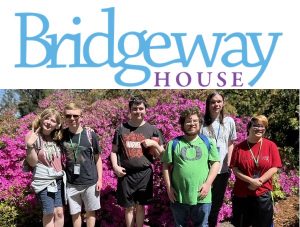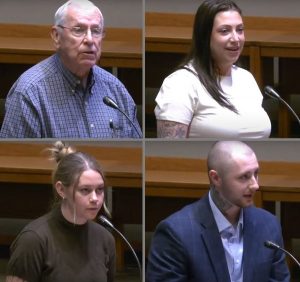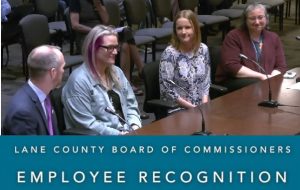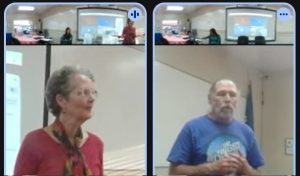Residents ask EWEB to preserve Leaburg Lake, lamprey habitat
10 min read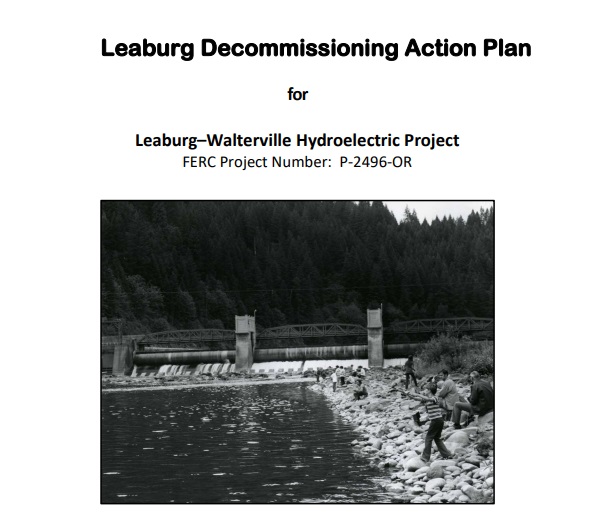
At the EWEB meeting Jan. 9, public speakers asked the board to reconsider its decision to remove Leaburg Dam.
[00:00:07] Nadine Scott: My name is Nadine Scott. I’m an EWEB ratepayer and a homeowner on Leaburg Lake and a real estate broker. I read your Leaburg project decommissioning update of Jan. 8.
[00:00:20] My question is: Why are we destroying everything we already have in place instead of maintaining it for a fraction of the cost? EWEB could donate the dam and bridge to the state or the county and have them maintain it. EWEB estimates the cost to just destroy the dam at about $35 million of your bigger plan of $221 million.
[00:00:49] The dam and the bridge and road could be repaired for a fraction of the cost, about $15 million versus destroying it for a cost of $35 million. Building a new road would cost $15 to $25 million. Tourism and businesses would continue to thrive. Home values would continue to increase. Handicapped fishing access would still be available, which is a tourist attraction.
[00:01:22] Water sources for fire retardation would still be available. Emergency services and evacuation roads would be continued. EWEB could give state and county the $15 million to repair the road and maintain it for several years to come and EWEB would save their ratepayers $20 million. Key points I’d like you to consider:
[00:01:53] The dam was built in 1928. It’s a historical landmark. The bridge and dam is the only ingress / egress for homeowners on Leaburg Dam Road and the Fish Hatchery Road. Emergency response, evacuation, home health care, all depend on ingress / egress of the road on the dam. There is no alternative route. Tourism is the main economy for the McKenzie River Valley.
[00:02:17] Tourism is the main economy for the McKenzie River Valley. Loss of businesses and revenue would be devastated. Leaburg Fish Hatchery is a huge tourist attraction. Loss of property values. We purchased property on Leaburg Lake because we want to live on a lake. Loss of property from erosion and loss of water rights. Contamination of well water while dismantling the dam and the bridge. Environmental impact on the land, air, river, and water.
[00:02:57] Gary Hatfield: I’m Gary Hatfield… Look, it’s pretty clear that the comments that have been made to this board in the past, whether it be meetings up the McKenzie, really, in our perspective, have gone unheeded.
[00:03:11] I’m trying to explain to you things that are relative to the group in the community. I represent 60 homes and a community of citizens up there that pay their bills to you guys every month.
[00:03:23] You’re decent people, but not one of you has a brain as God gave a goat or the character to stand up and say, ‘Wait a minute. You got a dam that was built in 1928.’ You have a bunch of people and a lot of them cried last time that they were up the river when you met them. Some of you were there. Some of you weren’t.
[00:03:41] They’re crying for their neighbors. They’re asking for somebody to try to help them. And quite frankly, I don’t know that anybody out there really wants to stand up and really look at all the money and the issues involved.
[00:03:53] But look, you’re good people, you’re on the wrong side of this one.
[00:03:56] …It appears to me that one thing that you folks have prided yourselves with is ‘Rely on us…’ ‘Rely on us’ means you rely on real communication, real challenges, and real digging into it.
[00:04:09] Minds have already been made. Not a darn thing we can do about it except express that and then the next step is to get a band together and get some legal action and try to forestall what possibly is going to come to pass.
[00:04:22] Look, EWEB hires a lot of lawyers. There are going to be a lot of them that aren’t going to want to participate because they have done business with you in the past, so you have to go outside to find somebody to do something to say, ‘Wait a minute, think about it.’ But when you make your vote, understand there is a list of items there that you’re not giving, I don’t think, proper process to.
[00:04:43] And I said last time I was here, in 1968, I was a lot younger then, and I was out there doing the research for the U. S. Army Corps of Engineers, And when they came out there, one thing that they said was, the lakes are part of the asset of this area and we want to preserve them. I was a young man then. I’m still trying to preserve Leaburg Lake, okay? As we are the other lakes out there. And also the fact that in those days, there was a different attitude and perspective relative to what we’re speaking at today. There’s more to it than dollars and cents.
[00:05:17] But I do think the process has to get better, folks, because people do care.
[00:05:21] Jeff: Hello, I’m Jeff… 64. That’s how old I am. I get a pioneer fishing license this year for the first time. It cost me $6 and saved me a lot of money and I was proud of that. I lived in Oregon for 50 years and I’m nearly 65 years old. And most of that’s been on the McKenzie and the last 26 of it has been on Leaburg Lake.
[00:05:43] Five years. Five years old: That’s how old I was when I caught my first fish. And it was on Leaburg Lake with my grandfather who pioneered that way. That lake’s been around forever. I live on it. I see it every single day. You people don’t. I could live without electricity. I can’t live without water. Water from our well has supplied over 30 homes right there in our water district and just today I got calls from people going, ‘Wow. We need to a new secretary. We’re going to have to hire somebody. If we do, we’re going to raise our rates. Oh, no, we can’t raise the rate for a fixed income. We can’t afford that. Well, what happens when you people spend $31 million, another $15 million and then you screw up our roads.
[00:06:25] We do all that we do up there. What’s going to happen to our rates? Just before I got here, I got a call from a friend. He said, ‘Gee, Jeff, you’re going to the meeting and I understand it. They’re going to get rid of the dam. What’s that going to do to me downriver?’ He owns property on the river downriver.
[00:06:39] I watched what happened when they drained Cougar Reservoir. It all landed right in front of my house. It became a island. There was nothing there in that river and then now I’ve got a full-blown island with trees and snags and all kinds of things.
[00:06:55] So, when you let go of what’s out there, where’s it all going to go? What’s it going to do? I just don’t see it. I mean, what I see happening now is a wonderful recreation area where a ton of people come up. I see kids from five years old to 80-year-old women out there every day in their canoes getting their exercise, and kayaks. And now what I see is going to happen is you’re going to drain the lake and you’re going to have to put clams in there because what’s happening is 99 percent of that thing is going to be nothing but clam digging water.
[00:07:22] There’s going to be just—I’ve seen it when you drain the lake. It’s just mud. And we, I’m going to have the world’s longest dock, I’m going to have a 50-yard dock just to get out to the water. And that’s not why I bought my house. I can do without EWEB. I can do without. I love you guys.
[00:07:39] And you guys save our asses every single time when the rain and the snow and limbs break. But this is a big deal. And I sure hope, this is, I’m a human being. My kids grew up on that river. My grandfather pioneered it. We’re all here. We’re all part of the human race. And water is something we need and we need recreation.
[00:07:56] We don’t need, we get enough politics. I don’t even watch the news anymore. It’s not fun because it’s all negative. Why do I want more negativity in my own backyard? I should go at least open the doors, see a few osprey, see some fish jump, go fishing and enjoy what Mother Nature put in my yard without people ruining it.
[00:08:14] John Q: Concerns about mercury and lamprey at the public forum Jan. 9:
[00:08:19] Unidentified public speaker (at EWEB meeting Jan. 9, 2024): On the same thing with the dam removal: I live along the McKenzie. I have a three-year-old toddler. We’re out there every single day, swimming in the river, playing in the river, playing in the silt, the mud, making sand castles, fishing, kayaking, and just a wonderful place to be.
[00:08:37] My concerns: I’m also a scientific diver. I worked for the aquarium for a number of years, volunteering, and I’ve done a lot of scientific dives throughout Oregon for environmental impact studies and stuff like that. I’m sure you guys know the history of the McKenzie River valley and the road going up, (Highway) 126 was actually created for the gold rush in Leaburg—massive amounts of gold, tons of people moving up there.
[00:09:00] They created these roads up there to go after this gold. And as we all know, gold mining was not the cleanest thing 100 years ago, and they used a lot of mercury. And that mercury throughout the whole country, all these old reservoirs, that mercury settles to the lowest point because it’s heavy like gold.
[00:09:17] These reservoirs are holding back ungodly amounts of mercury. And as much as I’m excited about the idea of salmon running up the river and restoring the river to its native state, that’s really exciting to me. However, the amount of mercury that’s going to be released into our rivers is unbelievable, and I don’t, I haven’t seen any studies or any ideas of how people are going to address that.
[00:09:39] I know I’ve seen a similar dam removal in Montana, where it costs a couple billion dollars, that’s billion with a B, to remove all of those sediments with toxins in them to a safe place. And I don’t think we’re going to be doing that up there. I’m guessing most of that mercury that’s settled behind that reservoir is going to be washing right down into my backyard.
[00:10:00] And into my children’s feet and it’s the fish we’re eating. Maybe, maybe not. Maybe you guys have an answer that I just didn’t see it on these things, but I believe that to be happening. Another issue that I haven’t seen, and it actually came from one of your biologists that I was talking to, the largest per square footage number of juvenile lamprey, which is a threatened species of fish, largest percentage, largest number of those in the planet, in the world, is in Leaburg Lake, in those sediments. The sediments created an ideal habitat for those juvenile lamprey.
[00:10:32] And they’ll live there for 10 to 12 years before they release and make their way to the ocean. And I don’t know how that habitat is going to be replaced. So that’s going to be a huge environmental issue as well. But yeah, beyond that, I wish you guys luck in figuring all this out. It’s going to be chaos watching these meetings and that’s just the environmental issue.
[00:10:52] Then you have these homeowners who bought these homes, however many years ago, who are now going to have a highway in their backyard. I’m sure every single one of you who owns a home feels that pain, of buying your dream home and having it ruined by something that’s created progress or development or anything else.
[00:11:09] I can’t even imagine what it’s like for these people. Luckily, my home’s protected. It’s in the lower flats from traffic, but it’s not protected from the sediments.
[00:11:17] Sonya Carlson (EWEB commissioner): I haven’t heard about mercury in the sediment. Is that something that, I mean, I’m assuming it’s part of the plan that this will be looked into, but is that something that—?
[00:11:29] Frank Lawson (EWEB general manager): We’re outlining a really robust process and there’s going to be a number of environmental studies that take place as part of that process, public input as part of that process. Some of that is done by EWEB and so there’ll be a lot of outreach and opportunity to interact with EWEB.
[00:11:47] And then there will also be a FERC (Federal Energy Regulatory Commission) process, which is our regulator, after that point. I know that in the case of Leaburg, there’s been several, I’ll say, flushings of the reservoir the last number of years, including when we had to redo the rollgates. Also when there was the fire, that flushed the reservoir as well, but if there is, we’ll certainly be testing that amongst other things relative to the environmental studies that we have to do. It’s going to be a number of years’ worth of process and a lot of different analysis and studies that have to be completed as part of that process.
[00:12:27] John Brown (EWEB commissioner): As far as the lampreys, we addressed that issue once with ODFW (Oregon Department of Fish and Wildlife), when we had to, we were having to dredge around where the salmon fish ladders are, because the sediment was building up, and what they decided to do is just, in high water events, is take a backhoe and take that sediment, put it into the flow, and let all that sediment and the lampreys go down the river, because ODFW thought that’s the best way to protect them, rather than take the sediment out. And so they’ve addressed that before.
[00:12:54] John Q: EWEB says future studies will check for mercury levels behind the dam and consider whether dam removal will affect lamprey populations.
